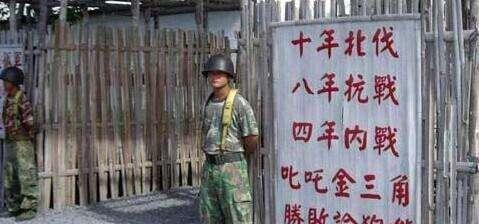At the end of the Liberation War, under the offensive of the People's Liberation Army, the Kuomintang troops fled southward, some were transported to Taiwan, and some fled to Vietnam, Burma and other Southeast Asian territories. Most of the Kuomintang troops who fled to Southeast Asian countries were taken back to Taiwan, but one unit remained in a foreign country, this unit was the Kuomintang 93rd Division.

The 93rd Division of the Kuomintang Army was originally subordinate to the Eighth Army of the National Revolutionary Army, which was incorporated into the Chinese Expeditionary Force during the War of Resistance. In February 1942, the 49th Division and the 93rd Division of the Eighth Army entered the Jingdong area of Burma and fought more than 1,500 kilometers in Southeast Asia, repeatedly inflicting heavy losses on the Japanese army and dealing unprecedented heavy blows to the Japanese army. After the Eighth Army was defeated by the People's Liberation Army in Hunan, Commander Li Mi left his troops and fled to Taiwan, and the 93rd Division retreated all the way to the south, gradually fleeing from Guangxi to Burma and Thailand.
In the second half of 1948, the officers and men of the 93rd Division also used some of the families of the fleeing troops to live a life of living in limbo and wandering around. In early 1950, the 93rd Division and another regiment, the division headquarters of a division, a total of more than 7,000 officers and men and their families retreated to the China-Burma border. In the face of so many Chinese troops, the Burmese government did not want to accept it, so it concentrated its absolute superiority in troops to encircle and suppress the Kuomintang 93rd Division, although this unit was gradually defeated under the attack of the People's Liberation Army, but after all, it was the troops that participated in the Northern Expedition and the War of Resistance, and effortlessly defeated the Burmese government army.
Li Mi saw that his remnants had gained a foothold in the Golden Triangle and had won the battle against the Burmese government army, so he immediately asked Chiang Kai-shek for credit. Chiang Kai-shek was also very happy, and he felt that this unit could serve as the main force in the future counterattack on the mainland. After a year of rest, in order to further fight for his rights and interests in Taiwan, Li Mi ordered the 278th Regiment of the 93rd Division to launch a counter-offensive against the mainland, at that time the People's Liberation Army did not think that there was this Nationalist army unit, and did not send troops to defend the border, so it was caught off guard, and four border cities were conquered in a month. Nino immediately mobilized three divisions and repelled them.
After the 93rd Division returned to Burma, India sent elite troops and Burmese government forces to encircle and suppress the 93rd Division, but it was soon beaten by the Nationalist 93rd Division. The Burmese government really couldn't bear to look at it, and at the United Nations accused the Taiwan authorities, demanding that the Kuomintang withdraw its troops in Burma, and the Taiwan side withdrew the old, weak, sick and disabled of the 93rd Division, and the main force remained.
After some twists and turns, the Kuomintang 93rd Division also recognized the true face of the Taiwan authorities, so it later stopped obeying the orders of the Taiwan authorities. In order to survive, the officers and men of the 93rd Division began to cultivate opium in the border areas to provide protection for drug trafficking forces. In 1970, through the intervention of the Thai royal family, the Thai king personally commanded the remnants of the 93rd Division of the Kuomintang Army occupying the Golden Triangle region, and under the leadership of General Duan Xiwen, surrendered all weapons to Thailand, and all the soldiers and their dependents became Thai nationals.